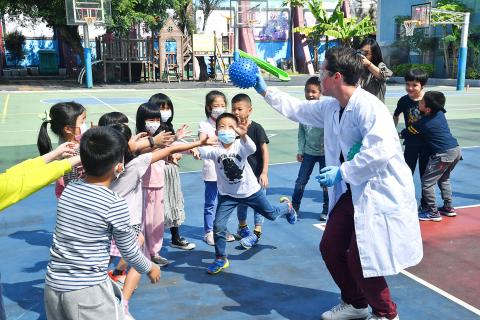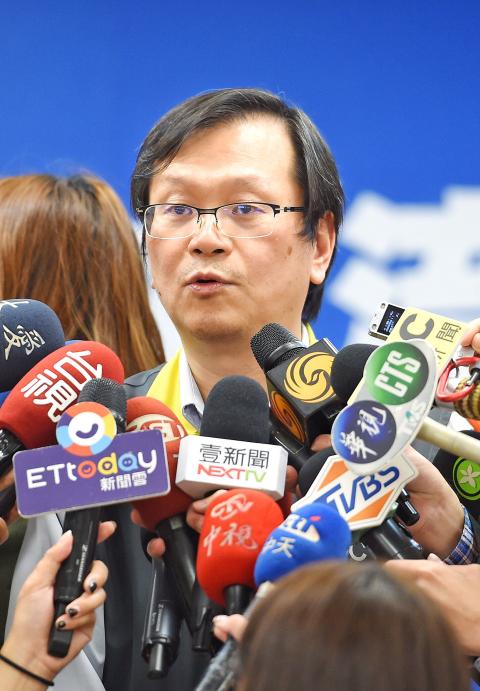The Central Epidemic Command Center (CECC) yesterday raised its travel advisory for Iran to a level 2 “alert” due to increased risk of COVID-19 infection, and confirmed a new case in Taiwan — a foreign caregiver who had been taking care of a previously confirmed case.
“The number of deaths related to COVID-19 in Iran has been continuously growing, although the number of confirmed cases it reported was not so high, so we think the epidemic situation is relatively serious,” said Minister of Health and Welfare Chen Shih-chung (陳時中), who heads the center.
The level 2 “alert” means people are advised to take increased precautions when visiting Iran, he said.

Photo: CNA
The number of COVID-19 cases outside China was still serious as of yesterday, with South Korea, Italy, Japan, Iran, Singapore and Hong Kong having confirmed more cases, Chen said, adding that the CECC and other agencies would continue to closely monitor the situations in those countries.
Meanwhile, Chen said the nation’s 32nd case of COVID-19 was confirmed yesterday.
She is a 31-year-old foreign caregiver, who was taking care of the nation’s 27th confirmed case — a man in his 80s who is living in northern Taiwan — when he was hospitalized for pneumonia.

Photo: Liu Hsin-de, Taipei Times
Four of the octogenarian’s family members — his wife, two sons and a grandson — have tested positive for the virus.
A contact investigation for the foreign caregiver is being carried out and a health department is investigating her movements from Feb. 16 to Monday, Chen said, adding that the places she went to might be publicized if the center considers it necessary.
Centers for Disease Control (CDC) Deputy Director-General Chuang Jen-hsiang (莊人祥) said that the woman looked after the octogenarian from Feb. 11 to Feb. 16 while he was in hospital, and after he tested positive for the virus, the department started looking for her.
As the woman was working illegally, the department had to ask police to help search for her, he said, adding that they found her on Monday night and she had a mild sore throat.
CDC Director-General Chou Jih-haw (周志浩) said that all medical professionals who had close contact with the caregiver tested negative for COVID-19, so the contact investigation is mainly to find people she had close interaction with outside the hospital.
Meanwhile, Department of Medical Affairs Director-General Shih Chung-liang (石崇良) said that the 134 hospitals designated to handle infectious diseases would within a week expand their number of isolation wards and would specialize only in handling people with suspected respiratory disease or severe pneumonia with novel pathogens.
Strict access control would be required for the specialized wards and healthcare personnel working in the wards would not perform duties in other departments to avoid cross infection, he said.
Previously, only four to six isolation wards were allowed per 100 hospital beds, but the restriction would be temporarily lifted at these hospitals, Shih said, adding that patients without pneumonia-like symptoms would be admitted to other hospitals.

CROSS-STRAIT COLLABORATION: The new KMT chairwoman expressed interest in meeting the Chinese president from the start, but she’ll have to pay to get in Beijing allegedly agreed to let Chinese Nationalist Party (KMT) Chairwoman Cheng Li-wun (鄭麗文) meet with Chinese President Xi Jinping (習近平) around the Lunar New Year holiday next year on three conditions, including that the KMT block Taiwan’s arms purchases, a source said yesterday. Cheng has expressed interest in meeting Xi since she won the KMT’s chairmanship election in October. A source, speaking on condition of anonymity, said a consensus on a meeting was allegedly reached after two KMT vice chairmen visited China’s Taiwan Affairs Office Director Song Tao (宋濤) in China last month. Beijing allegedly gave the KMT three conditions it had to

STAYING ALERT: China this week deployed its largest maritime show of force to date in the region, prompting concern in Taipei and Tokyo, which Beijing has brushed off Deterring conflict over Taiwan is a priority, the White House said in its National Security Strategy published yesterday, which also called on Japan and South Korea to increase their defense spending to help protect the first island chain. Taiwan is strategically positioned between Northeast and Southeast Asia, and provides direct access to the second island chain, with one-third of global shipping passing through the South China Sea, the report said. Given the implications for the US economy, along with Taiwan’s dominance in semiconductors, “deterring a conflict over Taiwan, ideally by preserving military overmatch, is a priority,” it said. However, the strategy also reiterated

‘BALANCE OF POWER’: Hegseth said that the US did not want to ‘strangle’ China, but to ensure that none of Washington’s allies would be vulnerable to military aggression Washington has no intention of changing the “status quo” in the Taiwan Strait, US Secretary of Defense Pete Hegseth said on Saturday, adding that one of the US military’s main priorities is to deter China “through strength, not through confrontation.” Speaking at the annual Reagan National Defense Forum in Simi Valley, California, Hegseth outlined the US Department of Defense’s priorities under US President Donald Trump. “First, defending the US homeland and our hemisphere. Second, deterring China through strength, not confrontation. Third, increased burden sharing for us, allies and partners. And fourth, supercharging the US defense industrial base,” he said. US-China relations under

The Chien Feng IV (勁蜂, Mighty Hornet) loitering munition is on track to enter flight tests next month in connection with potential adoption by Taiwanese and US armed forces, a government source said yesterday. The kamikaze drone, which boasts a range of 1,000km, debuted at the Taipei Aerospace and Defense Technology Exhibition in September, the official said on condition of anonymity. The Chungshan Institute of Science and Technology and US-based Kratos Defense jointly developed the platform by leveraging the engine and airframe of the latter’s MQM-178 Firejet target drone, they said. The uncrewed aerial vehicle is designed to utilize an artificial intelligence computer